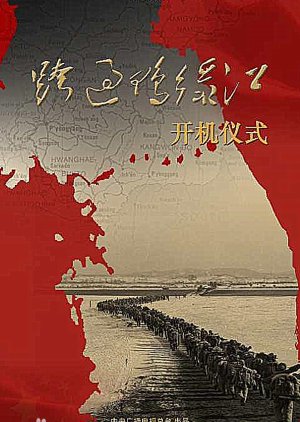Yang Chengwu proposed to let each combat team bring a machine gun for cover, and combine the distance and near to strike. The soldiers of the anti-tank brigade kept advancing against the fierce artillery fire. After one person fell, one person continued to advance with the barrel, and even rushed forward with a grenade to blow up at close range. Volunteer soldiers mastered anti-tank combat skills overnight, but the US military still has 200 tanks intact. In order to increase the hit rate, the anti-tank brigade can only put the tanks close and then fight again, and then retreat and strike again after the battle. Yan Xiangzi deliberately led the tank forward and ordered the muzzle of the tank to be lowered, but this would increase the recoil received by the soldiers and might even accidentally injure himself. But in order that the tanks could not attack, the soldiers resolutely lowered their muzzle and launched a violent bombardment on the enemy's tanks and infantry. In the end, the soldiers rushed forward, launched a hand-to-hand battle with the US army, and resolutely repelled another attack by the US tank division.
Defeating the superior by the inferior, the wise and brave soldiers will face the enemy. Mao Zedong smiled and said that Yang Chengwu's poems were as straightforward as he was in battle. Zhou Enlai thought about the scene where he led the death squad to break through 16 years ago, and lamented that Chinese warriors were still fighting on the battlefield 16 years later. Before the United States initiated negotiations, Mao Zedong personally drafted a reply to the United States. Li Kenong said to Mr. Peng that the negotiation would take place again soon, which brought him back to the battlefield. Sure enough, Li Qiwei restarted the negotiation again and proposed to switch to the negotiation in Panmunjom.
The negotiation time was set for October 25. Mao Zedong accepted all the irrelevant conditions. The key is to negotiate a result. Li Kenong suggested that he first listen to the conditions put forward by the United States in order to maintain the flexibility and initiative of the negotiations, and take the opportunity to propose an agreement on the 38th parallel. Deng Hua and Bian Zhangwu, who were half-dead by negotiations, returned to the North Korean headquarters. President Peng knew that only a good fight can make a good negotiation. The United States is now back to the negotiating table and will never stop adding volunteers to the army. trouble. Deng Hua conveyed the policy of the enlarged meeting of the Political Bureau of the Central Committee, focusing on promoting the development of the domestic economy and paying attention to the economy. President Peng proposed to make overall adjustments to the military, and the entire army will move to the stage of consolidation. In order to meet the needs of negotiations, the Volunteer Air Force will cooperate with the army in fighting island-by-island seizures to put pressure on the negotiations.
The suggestion put forward by the US representative is almost to use two positions in exchange for Kaesong, and claimed that this move guarantees the safety of the east and middle lines of China and North Korea, while for the United States and South Korea, it has ensured the safety of the capital Seoul, unexpectedly on the first day. The negotiations ended smoothly. On the second day, the DPRK opposed the delineation of the armistice line proposed by the U.S. representative and demanded that the armistice be carried out on the 38th parallel. The fundamental reason for the US representative's request lies in Kaesong, which is the bottom line of their negotiations and is not for discussion.
Many days later, the United States is still killing Kaesong, and Kaesong has great political significance in ancient times. This is why Rhee Seung-man insisted on this bottom line. Li Kenong emphasized that Kaesong is also a place where China’s negotiations must not be relaxed. Kaesong is meaningless to the Americans, and China and North Korea did not advocate the occupation of Kaesong. This leaves room for maneuver in the negotiations. He firmly believes that the United States will distinguish its interests. Will give in. Qiao Guanhua admired this set of clear logic, and Li Kenong warned him that he must not give in to principles. But then Li Kenong almost fainted due to a recurrence of heart disease. After the doctor's examination, the doctor reminded him that he must never work overloaded like this again, and separately explained to Qiao Guanhua that if Li Kenong had a large-scale myocardial infarction, it would be of no avail even after eating. Li Kenong is already in this condition, and he still insists on browsing today's negotiation report, and he will send it to Chairman Mao in time after the summary.
The U.S. finally decided to give up its military occupation of Kaesong, but added conditions to demarcate Kaesong as a demilitarized zone and divide the place where the armistice agreement was finally signed as a military demarcation line. The DPRK insists on dividing the military demarcation line with the 38th parallel, which is absolutely impossible to negotiate. Zhou Enlai excitedly took the good news sent by Li Kenong. The US proposed a location close to the demarcation line proposed by China, but with a 30-day relaxation period. Mao Zedong waved his hand and agreed to come down. Negotiations meant to be calm. They wanted 30 days and we gave him 30 days. The U.S. finally accepted the proposal to use the line of power contact as the military demarcation line, and the two sides would withdraw two kilometers each. The military line demarcation agreement finally ushered in the day of signing.
The United States wants to prevent North Korea from building a new airport, and they worry that it will be used by the Chinese Air Force. The solution retorted that North Korea’s construction of the airport is North Korea’s internal affair, and who they want to use is his freedom. There is no problem in the UN talks. If the United States continues to obstruct this point, China will maintain its consistent attitude and avoid discussion.
Washington was slightly dissatisfied with Li Qiwei's negotiations being too strong, and they agreed that North Korea could build a civilian airport. The Xiefang side firmly opposes this. North Korea is a sovereign country, and it is the right of a sovereign country whether to build civilian or military airports. The U.S. representative even openly stated that there is currently no fully sovereign country in the world. The solution pointed out that this is the cause of the American hegemonic mentality. There will surely be people in the world who support peace and freedom to rise up. North Korea is the best. example. The U.S. representative resolutely opposed the construction of a military airport. The solution coldly wished the U.S. a happy New Year on this day of the New Year, and the negotiations ended.
Chen Geng led Mr. Peng and others to visit the excavated tunnels, air defense, artillery, rain and cold, each hole has its own role, and all materials and facilities are readily available. It is not easy to dig such a tunnel. The soldiers of the Volunteer Army have simply created a miracle. The U.S. emperor will not hit the southern wall and will not look back. Xie Fang at the negotiating table is also very angry. Volunteers must be ready to fight at any time.
The United States hurriedly jumped into a deadlock over sovereignty issues in the negotiations. Truman ordered Li Qiwei to prepare for a new round of offensive.

